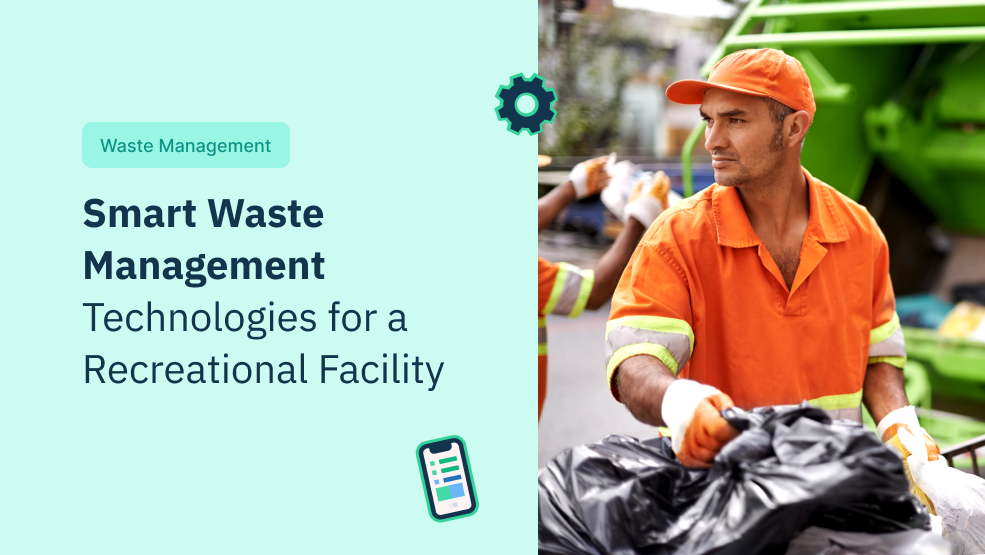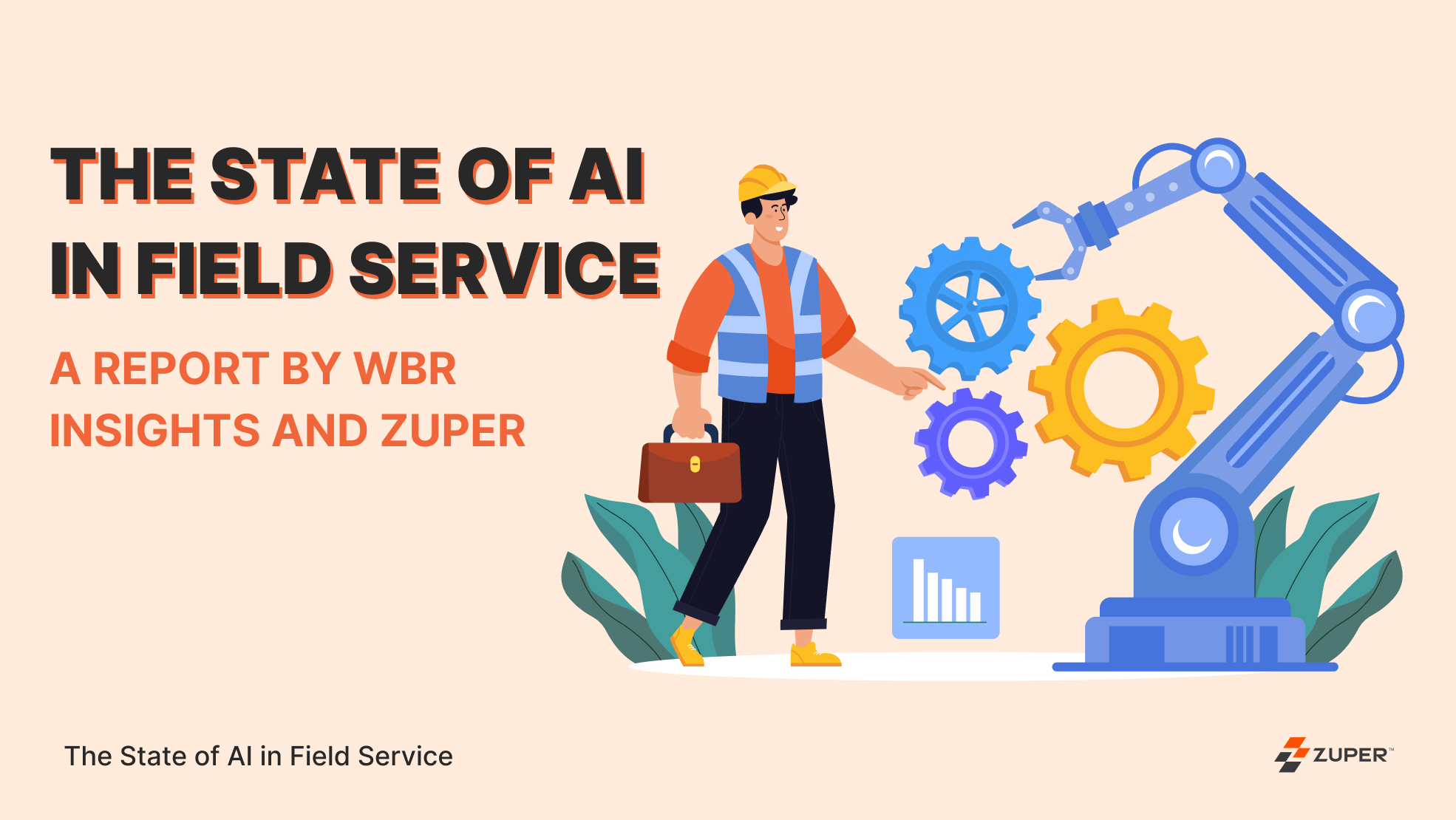Simplify your workflow with smart technologies and focus on more important tasks. Did you know that Americans generate roughly 250 million tons of trash every single year? The number of people requiring waste management services is only going to increase, and with that increase, we will need to find ways to better manage the waste that we are generating. In your struggle to manage waste collection and disposal, you must have heard about smart waste management technologies at least once.
If your answer is yes, you will find this article helpful as we will discuss some of the new technologies that can help optimize waste management and allow for more efficient use of resources. You will also learn about the uses of waste management software.
Problems faced by facility managers in scheduling waste pickups
1. Lack of real-time monitoring
When foot traffic increases in recreational facilities, especially on weekends and holidays, traditional bins can quickly reach their limit. Adding to it, overflowing bins become a challenge during festivals or peak tourist seasons. If you think about it, this problem is caused by a lack of real-time monitoring. Overflowing bins not only look unsightly but also create unhygienic conditions, attracting pests.
2. Time-consuming waste sorting
In single-stream sorting, all waste goes into one bin. Hence, you will be put in a situation where you need to sort out the waste from a central location. This process can be time-consuming and labor-intensive, especially for facilities with high waste generation, like recreational areas. It also increases the risk of contamination, as different types of waste are mixed together.
3. Improper waste disposal
The multi-stream sorting method involves separating waste into different bins for recyclables, compostables, and trash, which is an effective way to sort and recycle waste. However, users don’t always use it correctly, leading to confusion and improper waste disposal. As a result, manual sorting may be required in the end.
4. Reducing manual sorting
Manual sorting of recyclables or compostables by staff is both labor-intensive and prone to errors. Avoiding manual sorting is the primary goal of a facility. To do this, clear signage and public education campaigns that encourage the public to proper waste disposal should be done.
5. Absence of route optimization
Transporting waste long distances to landfills is costly due to fuel expenses. Ideally, facilities should have access to nearby recycling and composting facilities to minimize transportation costs and environmental impact. It is the duty of field managers to oversee these operations and find solutions to reduce fuel costs.
Smart waste management for a recreational facility
1. Ultrasonic trash that sends real-time alerts
Ultrasonic Trash Sensors offer a sophisticated solution to the challenges of waste management. By equipping bins with ultrasonic sensors that emit sound waves, these sensors can accurately measure the fill level by analyzing the echoes. This technology enables optimized collection routes, as crews are dispatched only when bins are nearing capacity, reducing unnecessary trips and fuel consumption. Additionally, these sensors provide real-time alerts to prevent overflowing bins, ensuring a clean and pleasant environment for visitors. Furthermore, analyzing sensor data can reveal patterns in waste generation, allowing for better planning and resource allocation.
2. Energy-saving solar-powered waste compactor
Solar-powered Waste Compactors represent a sustainable and efficient approach to waste management. These compactors, powered by the sun and strategically located in high-traffic areas, compress waste as it enters, significantly reducing its volume. This innovation leads to cost savings and environmental benefits, as the compactors can hold more waste—translating to reduced collection frequency. Moreover, utilizing solar power eliminates the dependence on fossil fuels, aligning with sustainability goals. Additionally, these compactors are smaller and more aesthetically pleasing compared to traditional bins, contributing to a visually appealing environment.
3. Image-based trash sensors
Image-based Trash Sensors revolutionize waste sorting and disposal. These bins use cameras to capture images of deposited waste, which advanced AI algorithms analyze to identify specific waste types. This enables efficient sorting at the source, differentiating between recyclables, organics, and general waste. By providing immediate feedback to users on proper disposal, these sensors reduce contamination of recyclable containers. Furthermore, analyzing the types of waste disposed of can inform targeted educational campaigns, promoting responsible waste management practices.
4. Smart waste bins
Smart Waste Bins offers an interactive and intelligent waste management solution. Equipped with sensors and displays, these bins provide real-time fill-level information to users through displays or smartphone apps. This encourages responsible waste disposal and prevents overflow. Moreover, integrated displays showcase instructions and information on what types of waste belong in each bin. Additionally, sensors collect data on fill levels, usage patterns, and user behavior, which can be analyzed to optimize waste management strategies.
5. Waste level sensors
Waste Level Sensors provide real-time monitoring of bin fill levels, enabling efficient scheduling of collection based on actual fullness. This optimizes operational efficiency and improves hygiene by preventing overflowing bins, contributing to a cleaner and more hygienic environment. Furthermore, optimized collection schedules minimize unnecessary collection trips, leading to fuel savings and reduced wear and tear on vehicles.
6. AI-recycling robots
AI-recycling Robots automate sorting and processing, accurately sorting different recyclable materials at high speeds. This improves sorting accuracy, minimizing human error and contamination of recycled materials. Moreover, with robots handling the sorting process, labor costs associated with manual sorting are significantly reduced.
7. Garbage truck weighing
Garbage trucks equipped with weight monitoring systems can continuously transmit data regarding their current capacity. This enables optimized routing and dispatching of trucks only if they weigh below a certain amount. Dispatching trucks only when they have room to run the complete route, minimizes unnecessary travel time because of multiple trips. Additionally, by avoiding partially empty trips, fuel consumption, and associated costs are significantly reduced. Analyzing truck weight data can reveal patterns in waste generation across different areas of the facility.
8. Pneumatic waste pipes
Pneumatic Waste Pipes offer an innovative waste transport system, eliminating the need for collection vehicles. This minimizes noise and visual pollution, creating a more appealing environment. Waste travels through the tubes at high speeds, enabling rapid removal from collection points.
9. Blockchain apps for tracing the recycling process
Blockchain Apps create a secure and transparent digital ledger for tracking recycling. This allows stakeholders to track the recycling journey from collection to processing and potential reuse. Enhanced transparency and accountability foster trust and responsible waste management practices. Additionally, blockchain technology provides a secure and tamper-proof record of the recycling process, minimizing the risk of fraud or manipulation.
10. Plasma gasification
Plasma Gasification is an advanced technology that converts waste into usable products. It can break down waste and generate syngas, a synthetic gas that can be used for electricity generation. Alternatively, it can convert waste into a stable, inert material called vitrified glass, significantly reducing landfill dependence. This contributes to a more sustainable waste management approach by minimizing the amount of waste sent to landfills.
11. Advanced composting technologies
Advanced Composting Technologies handle larger volumes of organic waste and accelerate the breakdown process. This results in high-quality compost, which is nutrient-rich and ideal for use in landscaping or gardens. Moreover, efficient composting minimizes methane emissions associated with organic waste decomposition.
12. Machine learning
Machine Learning analyzes vast amounts of waste management data, predicting future waste volumes and suggesting efficient collection routes. It can also identify areas requiring increased resources or predict maintenance needs for waste management equipment. This enhances efficiency and resource allocation in waste management.
13. IoT sensors
IoT Sensors connect waste management devices to a network, collecting real-time data on fill levels, location, and operational status. This data can be used to automate decision-making processes, such as scheduling collection or triggering maintenance alerts. Additionally, IoT sensors enable comprehensive system integration, connecting all elements of the smart waste management system for seamless communication and data exchange.
Benefits of smart waste technologies
1. Improved recycling rates
Increase your recycling rates twofold or even threefold! Smart bins with image recognition and AI sorting ensure only the right materials end up in the right bin, minimizing contamination and maximizing your facility’s recycling efforts.
2. Turns waste into energy
Ever thought garbage could be a power source? Plasma gasification can transform your waste into usable energy, like electricity, reducing your reliance on the grid and potentially generating revenue.
3. Automated waste collection
Picture waste collection happening seamlessly, without the need for manual intervention. Automated collection systems, like robots or self-compacting bins, remove the burden of manual labor and free up your staff for other tasks.
4. Route optimization
Eliminate wasted fuel on unnecessary trips. Route optimization software analyzes data from smart bins and trucks, creating the most efficient collection routes, saving you time, fuel, and money.
5. Less fuel usage
By reducing your fuel consumption by up to 20%, smart waste management systems optimize routes and avoid unnecessary pick-ups, leading to significant fuel savings and a smaller environmental footprint.
6. Recycles waste through chemical treatment
Chemical recycling breaks down complex materials like plastics into basic building blocks, enabling them to be transformed into brand-new products, creating a truly circular economy and overcoming traditional recycling limitations.
7. Quick turnaround rates
Smart sensors in bins can predict fill levels and send alerts, allowing for immediate action and preventing overflowing bins and unpleasant situations, saving you time and hassle.
8. Landfill modernization
Smart landfill management systems optimize space usage, minimize environmental impact, and capture biogas for energy generation, turning landfills into efficient and sustainable facilities.
9. Safety assurance
Equipped with features like compaction mechanisms and fire suppression, smart waste management systems ensure a safer work environment for your staff, minimizing the risk of injuries and accidents.
10. Innovate ways to recycle metals
Innovative technologies like bioleaching extract valuable metals from complex waste streams, creating new possibilities for resource recovery and a more sustainable future, redefining traditional metal recycling.
Role of waste management apps
Are you familiar with waste management apps? If not, let us introduce you to their benefits. If you have experience using one, we’d love to hear your feedback in the comments. Your insights can help others decide if they need one for their business.
1. Automation of daily tasks
Traditionally, waste management collection involved manual scheduling and route planning for trucks. Waste management apps automate these tasks. They can analyze waste bin fill levels (often via connected sensors) and optimize collection routes, reducing unnecessary trips and fuel consumption. This not only saves companies money but also lowers their impact on the environment.
2. Real-time insights
Gone are the days of relying on guesswork. Waste management apps provide real-time data on waste levels in various locations. This allows authorities and waste management companies to identify areas that require more frequent collection or strategize based on seasonal variations in waste generation. This data-driven approach fosters better resource allocation and improves overall efficiency.
3. Cut-down paper needs
Paperwork is a thing of the past with waste management apps. They eliminate the need for paper schedules, collection logs, and invoices. Residents can receive electronic notifications about collection days and recycling guidelines. Meanwhile, companies can manage everything digitally, streamlining operations and reducing their environmental footprint.
4. Quickly locate dumpsters using geolocation
Finding the nearest dumpster can be a hassle, especially in unfamiliar areas. Waste management apps leverage geolocation to help users locate nearby bins for proper waste disposal. This not only promotes responsible waste management but also reduces the chances of littering due to inconvenience.
5. Support services prevent delayed garbage collection
Delayed garbage collection can be frustrating and unsanitary. Waste management apps offer built-in support services that allow residents to report missed collections or overflowing bins directly to the waste management company. This helps keep neighborhoods clean, by ensuring prompt waste removal. Additionally, some apps allow residents to schedule bulky item pickups or request additional bins, streamlining communication and improving overall service.
Maximize your efficiency with Zuper
Choosing Zuper for your waste management software is a smart decision if your goal is growth. Zuper stands out for its flexibility, ensuring it can adapt to your evolving business needs. Its customizable solutions ensure that you won’t be stuck with a rigid software that hinders your progress.
Automation is key to working smarter, not harder. Zuper excels in this area, offering automated workflows that simplify tasks like scheduling waste pickups and dispatching crews. Zuper Dispatch Board, in particular, is a game-changer for service businesses, offering efficient dispatching solutions.
Real-time data is crucial in waste management to avoid delays and disruptions. Zuper not only provides real-time monitoring but also generates insightful reports from this data, helping you make informed decisions.
One of Zuper’s standout features is its seamless integrations. It can easily integrate with third-party applications, allowing you to maximize the benefits of IoT sensors, which are essential in waste management. With Zuper, you can seamlessly integrate IoT sensors and other third-party applications like CRM, ERP, accounting, and payments into your existing software stack, enhancing your waste management operation.
Improve customer service and automate tasks like sending quotes, and proposals
- Improved customer service: Zuper’s CRM integration can streamline communication with clients. Customer service reps can access all customer data and service history within Zuper, allowing them to provide faster and more personalized service.
- Targeted marketing: CRM data can be used to identify customer needs and preferences. This allows waste management companies to develop targeted marketing campaigns for specific services, such as bulk waste collection or composting programs.
- Enhanced sales opportunities: Zuper can automate tasks like generating quotes and proposals, freeing up sales reps to focus on closing deals. Additionally, CRM data can help identify potential new clients based on factors like location or waste generation volume.
Connect waste collection data with other business functions
Zuper’s integration with the ERP solution gives you tailored advantages. It streamlines tasks such as waste collection scheduling and asset tracking, cutting down on redundancy and manual effort.
- Optimized operations: Zuper’s ERP integration can connect waste collection data with other business functions, like billing and inventory management. This allows for a more holistic view of operations and can help identify areas for improvement.
- Streamlined back-office processes: ERP integration can automate tasks like generating invoices and managing waste disposal permits. This can save time and reduce the risk of errors.
- Improved data visibility: Zuper can provide a central repository for all waste management data, giving company leadership a clear view of key performance indicators (KPIs) such as collection costs and recycling rates. This data can be used to make data-driven decisions about resource allocation and pricing strategies.
Make the smart decision now
We are confident that we can make a significant impact on your waste management operation. If you’re looking to enhance your business with customization and flexibility, Zuper is the ideal choice for you. Don’t just consider it—take a smart step forward and try our free demo. Start your journey with Zuper and share your story of satisfaction after experiencing our product demo.
Step up and be a force for good. For every T-shirt you wear, over 700 gallons of water is consumed. You hold the power to reclaim gallons of water with every garment you wear. Choose minimalism; Save water. Mindful closet for a sustainable future!













